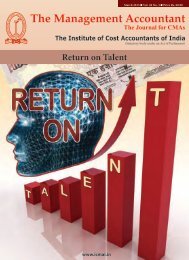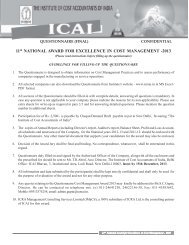This Issue - Icwai
This Issue - Icwai
This Issue - Icwai
Create successful ePaper yourself
Turn your PDF publications into a flip-book with our unique Google optimized e-Paper software.
COVER COVER ARTICLE<br />
ARTICLE<br />
Throughout the world people travel with<br />
different objectives such as business, conventions,<br />
participation in sports, recreation,<br />
relaxation—both at plains as well as in mountain<br />
resorts—or may be in night clubs, or to get to know<br />
different cultures, art, folklore, architecture, painting<br />
and religion. The two basic needs for a traveler all<br />
the time are shelter and food—which brings the Hotel<br />
industry to this front.<br />
Hospitality management is the academic study of<br />
the running of hotels, restaurants, and travel and<br />
tourism-related business. The hotel industry, which<br />
is an integral part of the tourism sector, provides a<br />
large percentage of the total employment in the<br />
tourism industry. A hotel needs the services of trained<br />
staff to provide professional services to national and<br />
international clients. The hotel and catering industry<br />
has been one of the fastest growing industries in the<br />
world in past 50 years. India’s hotel industry is<br />
thriving due to an increase in business opportunities<br />
and foreign and domestic tourism.<br />
Hotel business provides lodging, food, protection<br />
of luggage, different types of comforts and luxuries,<br />
services and facilities of entertainment to their clients<br />
under one roof. A hotel business can either be in the<br />
form of One Star to Five Star with deluxe amenities.<br />
Not only this, it can be either in the form of sole<br />
proprietorship or a partnership or a private limited<br />
or a public limited company.<br />
Like other business and industrial establishments,<br />
hotels too are commercial entities. A number of<br />
financial transactions take place :<br />
● from purchase of raw materials to conversion<br />
it into finished product for sale;<br />
● purchases of finished goods for sale in their<br />
original forms;<br />
● purchases of consumable articles; and<br />
● purchases of capital items from the suppliers,<br />
and sell of accommodations, meals, drinks and<br />
services to its clients.<br />
It is not possible that the owner or the employees<br />
remember all such transactions. So it is essential to keep<br />
a written record of all the transactions in appropriate<br />
books and records which may help in calculating the<br />
profit earned or the loss incurred during a particular<br />
CMAs in Hospitality Management<br />
Vinay Tandon*<br />
the establishment. It employs Managers, House<br />
Assistants, Receptionists, Stewards, Labours, Clerks<br />
and other staff to whom salary is to be paid. Having<br />
regard to their nature of business, there are certain<br />
accounting aspects which are tailor-made to this<br />
industry.<br />
Hotels maintain a number of registers, summary<br />
sheets and accounting books (vary according to the<br />
size and requirement of the hotel) for the purpose of<br />
providing a complete picture of the financial<br />
transactions. Hotels maintain their accounts in<br />
columnar to tabular form. Data of each head of<br />
income, expenditure, purchase and sales of each day<br />
are analysed for costing, control, forecasting and other<br />
managerial work by a CMA and it forms an integral<br />
part in hospitality management.<br />
Income Accounting<br />
In hotel industry two types of business—namely<br />
manufacturer and retailer—take place and products<br />
pass through many hands. Therefore, the problem of<br />
controlling is very vital. The accounts department is<br />
generally headed by a Financial Controller who may<br />
be assisted by an Assistant Financial Controller<br />
(depends on the hotels) who is/are supported by<br />
Credit Manager-cum-Income Accountant, Food &<br />
Beverages Controller, Head Cashier and Accountant<br />
for general accounting functions. In hotels the credit<br />
is allowed to all clients except a few who appear to be<br />
of doubtful nature and bring no luggage with them.<br />
Personal accounts of clients are opened immediately<br />
as soon as they arrive and occupy rooms in the hotel<br />
because their departure is always uncertain. A hotel<br />
has many departments—so cash is collected and credit<br />
is allowed at many points.<br />
The Credit Manager-cum-Income Accountant is<br />
responsible for proper recording of all income<br />
transactions into City Ledger such as Ledger of<br />
Individuals, Ledger for Offenders, Ledger for Credit<br />
Card Holders, Ledger for Travel Agencies, Ledger<br />
for Government Departments, etc.<br />
The Food & Beverages department deals with<br />
costing of daily consumption, preparation of monthly<br />
Food & Beverages reports, recommending selling<br />
prices of various items at Food & Beverages outlets,<br />
maintenance of a proper stores kardex/ledger for<br />
period of time and disclosing the financial position of * B.SC, PGDCA, PGDBA, FICWA, MIIA (USA)<br />
The Management Accountant |September 2011 757




